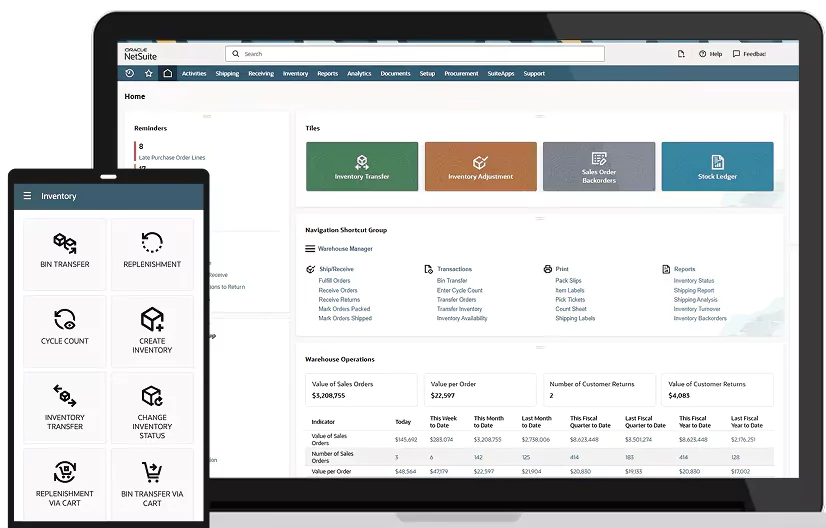Everything you need to know about NetSuite WMS

Efficient warehouse operations are integral to modern supply chains, and a robust Warehouse Management System (WMS) has become a must-have for businesses of all sizes. NetSuite Warehouse Management System (WMS) offers an end-to-end solution, deeply integrated with ERP, inventory, and fulfillment capabilities, all delivered via the cloud, with a mobile-first design at its core. In this article, we’ll explore what NetSuite WMS is, why it matters, who uses it, how it stacks up against other systems, and why partnering with a certified NetSuite Alliance Partner like Rand Group helps your business maximize your WMS investment.
What is NetSuite?
NetSuite is a cloud-based Enterprise Resource Planning platform developed by Oracle that helps businesses manage their core operations in a unified system. It offers a comprehensive suite of applications that include financial management, customer relationship management, inventory and order management, e-commerce, and professional services automation. Designed for scalability and flexibility, NetSuite supports businesses of all sizes, from startups to large enterprises, across a wide range of industries. Its real-time data visibility, role-based dashboards, and integrated workflows enable organizations to make informed decisions, improve efficiency, and drive growth. Because it is delivered via the cloud, NetSuite eliminates the need for costly on-premise infrastructure and provides users with access to critical business data anytime, anywhere.
What is NetSuite Warehouse Management System (WMS)?
NetSuite Warehouse Management System (WMS) is a cloud-based solution designed to optimize warehouse operations by automating core processes such as receiving, putaway, picking, packing, shipping, and inventory management. By integrating directly with NetSuite ERP, it ensures that all warehouse data is synchronized with financials, procurement, and order management systems. One of the distinguishing features of NetSuite WMS is its mobile-first approach, which empowers warehouse staff to perform their tasks in real-time using handheld devices and barcode scanning. This level of automation eliminates manual errors, increases speed, and provides complete visibility into warehouse performance.
NetSuite Warehouse Management System is particularly suited to organizations looking to move away from paper-based systems and spreadsheets, or those whose growth has outpaced the capabilities of basic legacy inventory management tools. With the ability to configure rules for putaway, picking, and cycle counting, and features like wave picking and real-time alerts, the system helps companies scale operations efficiently while maintaining accuracy and compliance.

Want to see NetSuite WMS in action?
Reach out today to schedule a custom demo with one of our expert NetSuite consultants. Get your questions answered and take a deep dive into a live NetSuite WMS dashboard.
What can NetSuite WMS do?
NetSuite Warehouse Management System (WMS) is designed to automate and streamline the full spectrum of warehouse operations. It replaces manual, paper-based processes and disconnected systems with real-time mobile workflows powered by RF (radio-frequency) barcode scanning. This enables more accurate data capture, improves visibility, and increases efficiency across warehouse functions, from inbound logistics to outbound fulfillment.
NetSuite Warehouse Management System key capabilities include:
- Inbound logistics & receiving
NetSuite WMS simplifies the receiving process by enabling warehouse staff to scan incoming goods directly against purchase orders using mobile devices. This scanning process enforces data accuracy, ensuring that only expected items are received and recorded properly. The system supports advanced inbound logistics features, such as container tracking for shipments in transit, and landed cost tracking to capture the true cost of inventory, including freight, tariffs, and taxes. Additionally, quality checks can be configured at the receiving stage to flag damaged or non-compliant items, helping businesses uphold supplier standards and reduce returns. - Putaway strategies & bin management
Once goods are received, NetSuite WMS intelligently directs items to the most appropriate storage locations using configurable putaway rules. These rules consider factors such as item type, movement velocity, dimensions, and weight to suggest optimal bin placements. The result is a more organized warehouse layout that minimizes picking time and improves space utilization. Bin management is dynamic and real-time, allowing for seamless adjustments as inventory levels change. Whether your facility uses fixed, random, or zone-based storage, NetSuite WMS adapts to your layout to keep operations running smoothly.
- Order fulfillment
NetSuite WMS enhances order fulfillment processes through a variety of advanced picking methods, including wave picking, zone picking, and multi-order picking. Wave picking enables multiple orders to be grouped and released based on criteria like order priority, ship method, or warehouse zone, which optimizes picker efficiency. The system also supports strategies such as FEFO (First Expired, First Out), which is particularly useful in industries with perishable goods, and pick-to-clean, which helps deplete inventory in partially filled bins. These fulfillment methods are all mobile-enabled, so warehouse workers receive digital pick instructions and confirm each step via barcode scanning, reducing mis-picks and ensuring timely shipments. - Pack & ship with Ship Central
Packing and shipping are simplified through NetSuite’s Ship Central interface, which guides warehouse personnel through the packing process with pre-configured workflows. The system suggests optimal packing sequences and validates that all items for a given order are correctly picked before proceeding. Integration with major shipping carriers allows for automatic label printing, rate shopping, and tracking number generation—all from a single interface. This streamlined approach not only reduces the risk of shipping errors but also accelerates fulfillment speed, leading to faster delivery and improved customer satisfaction. - Cycle counting with Smart Count
Smart Count, NetSuite’s real-time cycle counting feature, allows businesses to maintain inventory accuracy without disrupting warehouse operations. Unlike traditional physical inventory methods that require halting activities, Smart Count lets staff perform cycle counts while the warehouse remains operational. The system automatically schedules counts based on item classification, transaction history, and location. If inventory is moved or altered during a count, NetSuite alerts the user and allows them to pause or reset the process to maintain data integrity. This continuous validation ensures that inventory records remain accurate and audit-ready year-round. - Mobile-native operation
A core strength of NetSuite WMS is its mobile-native design, which supports handheld RF barcode scanning across all warehouse activities. From receiving and putaway to picking, packing, and counting, every process is accessible through mobile devices—giving warehouse staff the tools they need right at their fingertips. This mobile-first approach improves task execution speed, ensures accurate data entry, and provides real-time updates that sync with the central ERP system. As a result, managers gain full visibility into warehouse performance and inventory movements, enabling proactive decision-making and operational agility.
Key benefits of NetSuite WMS
Implementing NetSuite WMS delivers a wide range of benefits that directly impact warehouse efficiency and business outcomes. First and foremost, the system dramatically improves inventory accuracy by using barcode scanning and real-time data synchronization. This process reduces the likelihood of stockouts, mis-picks, and incorrect shipments, ensuring consistent customer satisfaction.
The second major benefit is operational efficiency. By automating tasks such as order picking and packing, businesses can increase output while reducing labor costs. Strategies like wave picking and pick-to-clean help warehouse staff fulfill multiple orders simultaneously, reducing travel time and improving order fulfillment speed.
In terms of cost savings, the NetSuite WMS supports FEFO (First Expired, First Out) picking strategies, reducing waste and ensuring compliance with regulations in industries like food and pharmaceuticals. Space utilization is also enhanced through intelligent bin management and location tracking, ensuring that frequently moved items are stored in easily accessible locations. These capabilities not only improve day-to-day operations but also provide a strong foundation for long-term scalability and agility.
Who can benefit from NetSuite WMS?
NetSuite WMS is designed to serve a diverse range of businesses and industries, from growing startups to complex global enterprises. Its scalability, flexibility, and native integration with NetSuite ERP make it a powerful tool for organizations looking to streamline their warehouse operations and improve accuracy, efficiency, and visibility.
Below are some of the typical users who benefit most from NetSuite WMS:
- Small and mid-sized businesses (SMBs)
Small and mid-sized businesses often begin with manual processes, spreadsheets, and basic inventory tools that become increasingly inefficient as operations grow. NetSuite WMS provides these companies with a cost-effective and scalable solution to automate their warehouse tasks and manage hundreds or even thousands of SKUs with greater accuracy. By eliminating paper-based processes, SMBs can reduce errors, enhance inventory visibility, and prepare their operations for continued growth without needing to invest in costly infrastructure. - Multi-location enterprises and distributors
Larger organizations with multiple warehouses, regional distribution centers, or international subsidiaries benefit significantly from the centralized inventory management capabilities of NetSuite WMS. These companies often require cross-subsidiary fulfillment, global shipping integration, and a real-time view of stock levels across multiple locations. NetSuite WMS supports all of this within a unified platform, enabling seamless coordination between warehouses and ensuring that inventory data is accurate, timely, and actionable throughout the supply chain. - Regulated industries with strict compliance requirements
Industries such as food and beverage, pharmaceuticals, and electronics often operate under strict regulatory requirements related to product traceability, expiration management, and quality control. NetSuite WMS offers essential features like FEFO (First Expired, First Out) picking, lot and serial number tracking, and enforced quality checks during receiving and fulfillment. These capabilities help companies in regulated industries maintain compliance while reducing waste and increasing accountability at every stage of the product lifecycle. - E-commerce and omnichannel retailers
Speed, accuracy, and real-time visibility are critical for e-commerce and omnichannel retailers competing in today’s fast-paced fulfillment environment. NetSuite WMS empowers these businesses to meet customer expectations by enabling rapid wave picking, multi-order batch processing, and real-time inventory tracking. Whether fulfilling direct-to-consumer orders, managing in-store replenishments, or handling returns, retailers can use NetSuite WMS to deliver a seamless and efficient order fulfillment experience. - Third-party logistics providers (3PLs) and warehouse partners
Third-party logistics companies and warehouse service providers that manage inventory and fulfillment for multiple clients rely on flexible and scalable systems. NetSuite WMS supports inbound consolidation, client-specific workflows, and multi-location inventory management, making it a strong fit for 3PLs. With its ability to handle diverse product types, customer-specific requirements, and integrated billing through NetSuite ERP, WMS enables 3PL providers to offer high-value services while maintaining operational control and profitability.
NetSuite Warehouse Management System pricing
NetSuite WMS is sold as a modular add-on to the core NetSuite ERP system. Pricing varies based on several factors, including the number of users, the complexity of the warehouse operations, and any additional modules or integrations required. Generally, the total cost includes the base ERP license, the WMS module, implementation services, and any necessary hardware or third-party integrations such as scanners and label printers.

NetSuite pricing guide
NetSuite takes a flexible, modular approach to subscription licensing, allowing you to configure products based on your specific business requirements. But what exactly is modular pricing? What add-on modules, like WMS, do you need? How can you determine the right service tier for your business? Download this guide to explore real-world pricing examples and gain a clearer understanding of NetSuite’s pricing structure and licensing options.
Comparing NetSuite WMS with other systems
When evaluating warehouse management systems, it’s essential to compare both ERP-integrated and standalone solutions. Platforms like SAP Extended Warehouse Management (EWM) and Blue Yonder are known for their robust capabilities in large-scale, complex environments. However, they typically involve lengthy implementations, high costs, and extensive customization—making them more suitable for global enterprises with dedicated IT resources.
Fishbowl serves smaller companies well with its basic inventory and warehouse functions, but as businesses grow, its standalone architecture and limited scalability can become constraints. Integration with financials, sales, and procurement often requires third-party tools, adding to maintenance complexity.
Microsoft Dynamics 365 Supply Chain Management (D365 SCM) offers a strong alternative for organizations already invested in the Microsoft ecosystem. It provides advanced warehouse and logistics functionality, deeply integrated with finance, procurement, and manufacturing. At Rand Group, we also recommend D365 SCM for companies with complex global operations or hybrid on-prem/cloud needs.
That said, NetSuite WMS stands out for its unified, cloud-native architecture, combining ERP and warehouse operations in one platform. With real-time data synchronization, intuitive mobile workflows, and lower total cost of ownership, it’s ideal for small to mid-sized businesses and rapidly growing enterprises. For companies already using NetSuite ERP, adopting NetSuite WMS is a seamless, high-value extension that delivers fast results with minimal complexity.
Why partner with Rand Group for your NetSuite WMS implementation
Choosing the right partner can make or break your WMS project. Rand Group, as a leading NetSuite Alliance Partner, offers both deep expertise and a proven approach to successful implementations. With years of experience delivering ERP and WMS solutions across a variety of industries, our team understands the complexities of warehouse operations and how to align them with NetSuite’s capabilities. We follow a SuiteSuccess-enabled methodology that incorporates industry-specific accelerators and best practices, ensuring a streamlined implementation tailored to your business needs.
Our NetSuite implementation services:
- Assessment: Evaluate current operations vs. NetSuite WMS; provide roadmap.
- Implementation: Configure inbound, picking, mobile scans, reporting, minimize disruption.
- Data migration & integration: Sync third-party carriers, scanners, label printers.
- Training & change management: Ensure staff adoption of mobile workflows and scanning discipline.
- Support & optimization: Post-launch support to tune pick strategies, dashboards, and throughput as business evolves.
Next steps: Start your NetSuite WMS journey
Investing in WMS yields significant impact, but success depends on expert implementation. Ready to transform your warehouse operations? Partner with our NetSuite experts for a comprehensive NetSuite WMS assessment, expert implementation, and ongoing support. Whether you’re just starting your digital transformation journey or looking to enhance your existing NetSuite environment, our team is here to help. Contact our team today to schedule your NetSuite WMS assessment and take the first step toward a smarter, more efficient warehouse.







